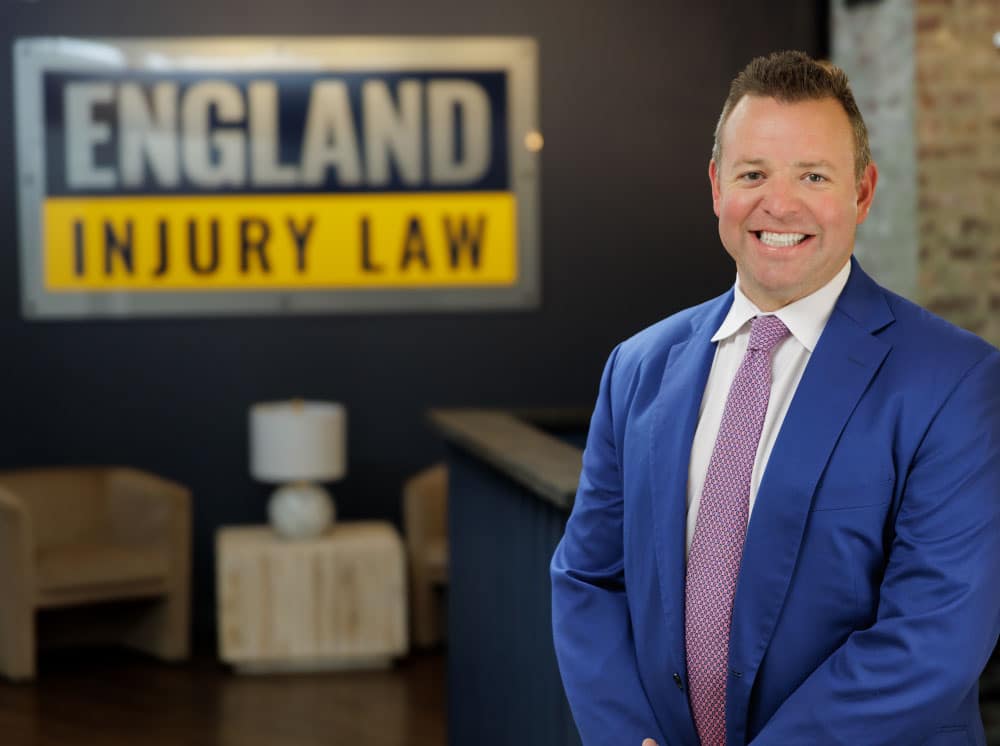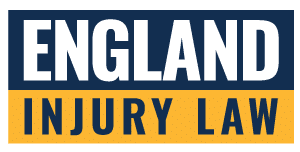Chattanooga Personal Injury Lawyer
Injured? Get Peace of Mind Today
If you or a loved one has suffered an injury, explore your legal options with England Injury Law.
England Injury Law, headquartered in the Chattanooga, TN and led by Zack England — who brings over 15 years of experience in personal injury claims — provides effective and compassionate legal representation for those who have been injured. We’re committed to helping you navigate the aftermath of an injury and aim to secure fair compensation for your injuries.
For a better understanding of your rights and personalized answers to your questions, take advantage of our Free and Confidential Consultation with our Chattanooga, TN personal injury lawyers.


Learn About Your Rights
We Want To Make This Easy For you
Contact Us
Dial 423-713-9225 or connect online.
Consultation
We'll answer all of your questions.
On Your Side
If we take the case, we get to work.
Injury Law Practice Areas
Serving Chattanooga, Tennessee

England Injury Law has the experience and resources to help you seek fair compensation to move forward after an injury.
A Focus On Personal Injury Claims
At England Injury Law, We Only Handle Personal Injury Claims
At England Injury Law, our focus is solely on personal injury claims. We feel this is a fundamental benefit to our clients for several reasons:
Deep Understanding of Personal Injury Laws
Focusing exclusively on personal injury law allows our attorneys to develop a deeper understanding of Tennessee personal injury claims. We stay abreast of the latest legal precedents, changes in legislation, and nuanced aspects of personal injury law, ensuring that our clients receive informed and effective representation.
Resource Allocation
Our resources are entirely devoted to personal injury cases. This means every tool, every piece of research, and every team member is laser-focused on areas that directly impact and benefit your case.
Diverse Claim Experience
Personal injury cases are diverse – from auto accidents to slip and fall incidents. We’ve encountered a broad spectrum of scenarios within Tennessee personal injury law. This experience translates into personalized, effective strategies for each client, ensuring the best possible approach for your unique case.
Knowledge of What You’re Going Through
Dealing exclusively with personal injury cases, we understand the physical, emotional, and financial toll these incidents can take on individuals and families. Our team approaches each case with the empathy and dedication it deserves, aiming to alleviate some of your burdens during this challenging time.
Chattanooga Personal Injury FAQs
How do I know if I have a personal injury claim?
To find out if you have a personal injury claim, just reach out to us at England Injury Law. Share what happened with our team, and we’ll give you an initial idea of where you stand based on the specifics of your case.
Tennessee’s ‘modified comparative fault’ rule is key in personal injury cases.
It allows you to still get compensation if you’re partly to blame for what happened, provided your share of the blame is under 50%.
But, there’s a catch – the amount you can recover gets trimmed by your fault percentage.
For instance, if you’re 30% at fault, your compensation shrinks by 30%. And if you’re 50% or more at fault, then, unfortunately, you’re out of luck for compensation under this rule.
There are time limits to when you can file a claim. Generally speaking, you have one year from the date of the incident to file a claim for your injuries to seek compensation.
If you’re past that deadline and don’t meet any special considerations, you may be barred from any type of recovery.
How can a lawyer assist me with my personal injury claim?
Having an experienced lawyer manage your case can lift a huge burden off your shoulders. They take on the heavy lifting, from paperwork and phone calls to negotiations, freeing you from the stress and investment of time that comes with personal injury claims.
Even if you decide not to hire a lawyer, getting informed advice from a professional who knows Tennessee’s personal injury law may make a difference. Getting a free consultation is a smart step towards understanding your situation better and making empowered decisions about your claim.
What is my personal injury claim worth?
When discussing “worth” of a claim, it’s important to remember there are many variables at play in personal injury claims.
Your medical bills, for instance, both those you’ve already faced and any anticipated future costs, play a big role.
If your injury kept you away from work, the income you’ve lost is also a crucial factor.
Beyond the financial aspects, your claim may take into account pain and suffering due to the injury.
If your injury means you’ll need ongoing care or rehabilitation, those potential costs are considered.
Every personal injury situation is unique, with its own set of challenges and considerations. That’s why talking to an experienced personal injury attorney can be valuable.
They can help you understand how all these factors apply to your specific case and what that might mean for your claim down the road.
What can I expect during a free consultation with your firm?
During your free and confidential consultation with England Injury Law, whether by phone or in person, our focus is on you and your unique situation.
We start by listening to your story, where you’ll share the facts of your injury. This helps us gain a complete understanding of the incident, your injuries, and their impact on your life.
With this information, we provide an honest and thorough evaluation of your case, pointing out any potential challenges.
Can I handle my personal injury claim without a lawyer?
While it’s true that not every personal injury claim requires a lawyer, and indeed, not every case may need one, it’s always wise to be fully informed about your options.
At England Injury Law, we encourage you to take advantage of our Free Consultation offer. This opportunity allows you to speak with an experienced personal Injury lawyer without any obligation.
Remember, hiring a lawyer is entirely your decision, but a consultation costs nothing except a bit of your time — a worthwhile investment to understand your claim better.
What does it mean to reach a settlement?
Reaching a settlement in a personal injury case means that the parties involved— generally the person who has suffered the injury and the insurance company or the party at fault — agree to a resolution without taking the case to trial.
This agreement usually involves the payment of a certain amount of money to the injured party in exchange for them dropping any further legal claims against the party at fault. The settlement amount is intended to cover various costs and damages, such as medical expenses, lost wages, and compensation for pain and suffering.
What are economic and non-economic damages?
In a personal injury case, compensatory damages are categorized into two main types: economic and non-economic damages.
Economic damages are those that have a clear financial cost associated with them. Examples include medical bills for treating your injuries, lost wages if you’re unable to work, and any other out-of-pocket expenses related to the injury, like rehabilitation costs or the cost to repair or replace damaged property.
Non-economic damages are more subjective and cover the intangible impacts of an injury. These can include pain and suffering, emotional distress, loss of enjoyment of life, and loss of companionship or consortium if the injury affects the relationships with close family members.
What are punitive damages?
Punitive damages are not awarded in every personal injury case.
They come into play when the person at fault was grossly negligent or showed a conscious disregard for the safety of others. These damages serve as a punishment to the wrongdoer and aim to deter similar negligent behavior in the future.
An example might be a driver causing an accident while under the influence, as this behavior could be considered grossly negligent, showing a disregard for the potential harm to others.
In addition to the general criteria for awarding punitive damages, Tennessee law sets a specific cap on the amount that can be awarded. The total punitive damages cannot exceed either two times the amount of compensatory damages awarded or five hundred thousand dollars ($500,000), whichever is greater.
Should I communicate with the insurance company of the other party?
If you’re injured and the at-fault party’s insurance company calls you, they’ll likely want to discuss what happened, learn more about your injuries, maybe offer a settlement, or ask for a recorded statement.
Remember, their goal during this call is to gather information that could minimize your claim or even lead to its denial.
There’s no need to be confrontational if an adjuster calls you. You can politely deny to speak at that time and hang up.
Before you speak with or sign anything from the at-fault party’s insurance company, contact an experienced personal injury lawyer.
Is it too late to speak with an attorney after giving a recorded statement?
It’s not too late to speak with an attorney, even after you’ve given a recorded statement to the insurance company after an injury.
A attorney can explain how your statement might affect your claim and what to do next.
Just make sure to tell your lawyer exactly what you said, so they can have all the facts to help you better understand your options.
How long do I have to file a personal injury claim?
In Tennessee, you typically have one year from the date of your injury to initiate a lawsuit. Failing to meet this deadline, known as the Statute of Limitations, could mean forfeiting your chance to pursue compensation. Yet, certain situations might extend this critical period:
- When criminal charges are involved, such as in cases of drunk driving, the window to file a civil lawsuit might be expanded.
- Extensions are also granted under special circumstances, including for those who are minors or have a mental impairment, ensuring they receive additional time to make their claim.
- Claims related to product liability and medical malpractice may follow different timelines, potentially offering more time to sue
Do personal injury claims typically require a court appearance?
In Chattanooga personal injury claims, whether you’ll need to appear in court depends on the specific details of your case. It’s noteworthy that a large number of these cases are resolved outside the courtroom in settlements.
At England Injury Law, our primary objective is to secure a fair settlement that meets our clients’ satisfaction, ideally avoiding the need for a court appearance.
If a fair settlement cannot be worked out, our team is fully prepared, willing, and equipped with the necessary resources and experience to take your case to court.
Should this happen, it may be necessary for you to make a physical appearance in court.






